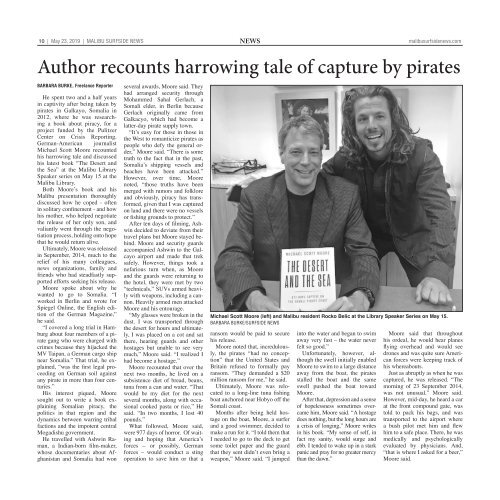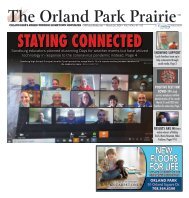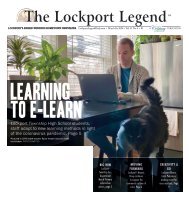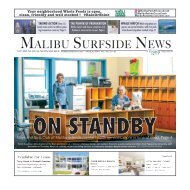MSN_052319
Create successful ePaper yourself
Turn your PDF publications into a flip-book with our unique Google optimized e-Paper software.
10 | May 23, 2019 | Malibu surfside news news<br />
malibusurfsidenews.com<br />
Author recounts harrowing tale of capture by pirates<br />
Barbara Burke, Freelance Reporter<br />
He spent two and a half years<br />
in captivity after being taken by<br />
pirates in Galkayo, Somalia in<br />
2012, where he was researching<br />
a book about piracy, for a<br />
project funded by the Pulitzer<br />
Center on Crisis Reporting.<br />
German-American journalist<br />
Michael Scott Moore recounted<br />
his harrowing tale and discussed<br />
his latest book “The Desert and<br />
the Sea” at the Malibu Library<br />
Speaker series on May 15 at the<br />
Malibu Library.<br />
Both Moore’s book and his<br />
Malibu presentation thoroughly<br />
discussed how he coped - often<br />
in solitary confinement - and how<br />
his mother, who helped negotiate<br />
the release of her only son, and<br />
valiantly went through the negotiation<br />
process, holding onto hope<br />
that he would return alive.<br />
Ultimately, Moore was released<br />
in September, 2014, much to the<br />
relief of his many colleagues,<br />
news organizations, family and<br />
friends who had steadfastly supported<br />
efforts seeking his release.<br />
Moore spoke about why he<br />
wanted to go to Somalia. “I<br />
worked in Berlin and wrote for<br />
Spiegel Online, the English edition<br />
of the German Magazine,”<br />
he said.<br />
“I covered a long trial in Hamburg<br />
about four members of a pirate<br />
gang who were charged with<br />
crimes because they hijacked the<br />
MV Taipan, a German cargo ship<br />
near Somalia.” That trial, he explained,<br />
“was the first legal proceeding<br />
on German soil against<br />
any pirate in more than four centuries.”<br />
His interest piqued, Moore<br />
sought out to write a book explaining<br />
Somalian piracy, the<br />
politics in that region and the<br />
dynamics between warring tribal<br />
factions and the impotent central<br />
Mogadishu government.<br />
He travelled with Ashwin Raman,<br />
a Indian-born film-maker,<br />
whose documentaries about Afghanistan<br />
and Somalia had won<br />
several awards, Moore said. They<br />
had arranged security through<br />
Mohammed Sahal Gerlach, a<br />
Somali elder, in Berlin because<br />
Gerlach originally came from<br />
Galkacyo, which had become a<br />
latter-day pirate supply town.<br />
“It’s easy for those in those in<br />
the West to romanticize pirates as<br />
people who defy the general order,”<br />
Moore said. “There is some<br />
truth to the fact that in the past,<br />
Somalia’s shipping vessels and<br />
beaches have been attacked.”<br />
However, over time, Moore<br />
noted, “those truths have been<br />
merged with rumors and folklore<br />
and obviously, piracy has transformed,<br />
given that I was captured<br />
on land and there were no vessels<br />
or fishing grounds to protect.”<br />
After ten days of filming, Ashwin<br />
decided to deviate from their<br />
travel plans but Moore stayed behind.<br />
Moore and security guards<br />
accompanied Ashwin to the Galcayo<br />
airport and made that trek<br />
safely. However, things took a<br />
nefarious turn when, as Moore<br />
and the guards were returning to<br />
the hotel, they were met by two<br />
“technicals,” SUVs armed heavily<br />
with weapons, including a cannon.<br />
Heavily armed men attacked<br />
Moore and his entourage.<br />
“My glasses were broken in the<br />
dust. I was transported through<br />
the desert for hours and ultimately,<br />
I was placed on a cot and sat<br />
there, hearing guards and other<br />
hostages but unable to see very<br />
much,” Moore said. “I realized I<br />
had become a hostage.”<br />
Moore recounted that over the<br />
next two months, he lived on a<br />
subsistence diet of bread, beans,<br />
tuna from a can and water. “That<br />
would be my diet for the next<br />
several months, along with occasional<br />
cooked pasta or rice,” He<br />
said. “In two months, I lost 40<br />
pounds.”<br />
What followed, Moore said,<br />
were 977 days of horror. Of waiting<br />
and hoping that America’s<br />
forces – or possibly, German<br />
forces – would conduct a sting<br />
operation to save him or that a<br />
Michael Scott Moore (left) and Malibu resident Rocko Belic at the Library Speaker Series on May 15.<br />
Barbara Burke/Surfside News<br />
ransom would be paid to secure<br />
his release.<br />
Moore noted that, incredulously,<br />
the pirates “had no conception”<br />
that the United States and<br />
Britain refused to formally pay<br />
ransom. “They demanded a $20<br />
million ransom for me,” he said.<br />
Ultimately, Moore was relocated<br />
to a long-line tuna fishing<br />
boat anchored near Hobyo off the<br />
Somali coast.<br />
Months after being held hostage<br />
on the boat, Moore, a surfer<br />
and a good swimmer, decided to<br />
make a run for it. “I told them that<br />
I needed to go to the deck to get<br />
some toilet paper and the guard<br />
that they sent didn’t even bring a<br />
weapon,” Moore said. “I jumped<br />
into the water and began to swim<br />
away very fast – the water never<br />
felt so good.”<br />
Unfortunately, however, although<br />
the swell initially enabled<br />
Moore to swim to a large distance<br />
away from the boat, the pirates<br />
stalled the boat and the same<br />
swell pushed the boat toward<br />
Moore.<br />
After that, depression and a sense<br />
of hopelessness sometimes overcame<br />
him, Moore said. “A hostage<br />
does nothing, but the long hours are<br />
a crisis of longing,” Moore writes<br />
in his book. “My sense of self, in<br />
fact my sanity, would surge and<br />
ebb. I tended to wake up in a stark<br />
panic and pray for no greater mercy<br />
than the dawn.”<br />
Moore said that throughout<br />
his ordeal, he would hear planes<br />
flying overhead and would see<br />
drones and was quite sure American<br />
forces were keeping track of<br />
his whereabouts.<br />
Just as abruptly as when he was<br />
captured, he was released. “The<br />
morning of 23 September 2014,<br />
was not unusual.” Moore said.<br />
However, mid-day, he heard a car<br />
at the front compound gate, was<br />
told to pack his bags, and was<br />
transported to the airport where<br />
a bush pilot met him and flew<br />
him to a safe place. There, he was<br />
medically and psychologically<br />
evaluated by physicians. And,<br />
“that is where I asked for a beer,”<br />
Moore said.


















